In this post, we raise the story of our youth-led social entrepreneurship program, Green Garden Bakery from our Heritage Park community in Minneapolis. These youth are leading the charge of creating healthier food options and access through their award-winning business.
They are disruptors.
Disrupting status quo. Disrupting systemic inequities. Disrupting mental models that create conditions for those first two things to persist.
Alfonzo, Leensa, and Maya are the youth leaders of the Green Garden Bakery (GGB). GGB is a youth run, green business selling vegetable-based desserts to the Minneapolis and Heritage Park community.
In 2014, after participating in gardening and cooking classes through Urban Strategies’ work in the community, the youth decided they wanted to turn their new skills into a business. A business where they grew the product, developed the recipe, developed the branding, and managed the retail aspect for distribution and sales. To top things off, the youth developed environmentally friendly packaging to support their responsibility for taking care of mother Earth.
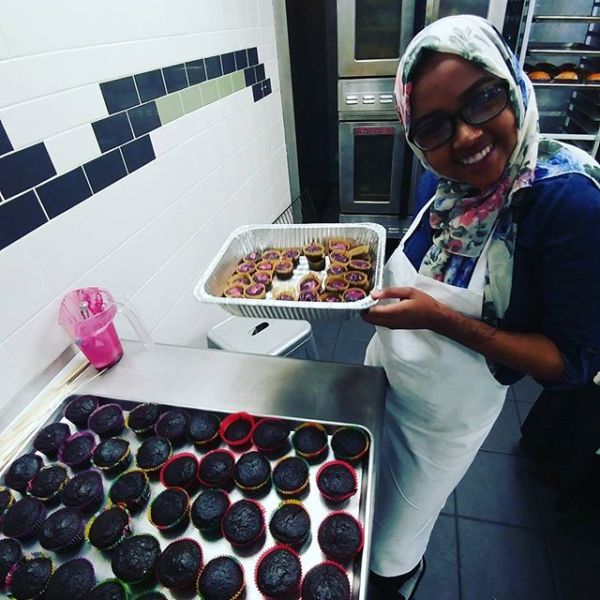
Their financial model is as incredible as the teens themselves; one third reinvested back into their business, one third paid to themselves, and one third invested into their community through charitable contribution. Since their business model is based upon this notion of thirds, it is only fitting that during my conversation with them, I readily identified a whole other division of thirds these remarkable teens address in the way they approach their work.
As the Chief Financial Officer, Leensa is among a very low number of females who dare veer into finance. In fact, as she recently learned from her own research, women make up only 10% of CFOs in all businesses. Leensa shared that she is the only female and the only African American in her computer coding class. A clear indicator of how our educational experiences can mirror where we see ourselves in the workforce. She goes on to say that “Women believe they are not capable. It comes from society, TV, stereotypes, because you are black and a woman, there is no one else like you in the field.”
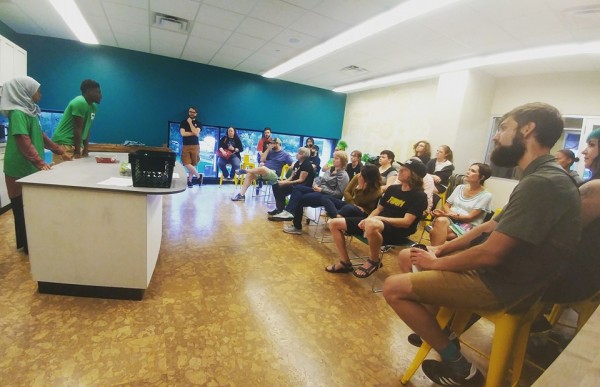
Alfonzo identified that he is aware of how he and others like him are classified by society. “Young black males are not seen as being interested in business. People assume that we are in the streets.” This is a matter of truth that he is confronted with on a daily basis. His role of Chief Executive Officer fundamentally challenges this wrongly labeled narrative. GGB has 100+ youth from the local community enrolled in a youth development program that supports the business. This program provides out-of-school time activities and teaches gardening, baking, and the ins and outs of developing and running a business.
Maya, Entrepreneurship Chair, believes that she has benefitted from having the experience to learn the importance of networking. “It has given us a resume; more specialized skills. For young African Americans often people don’t open up that door [for networking].”
Though the disruption of gender and racial stereotypes was not included as a part of their official business plan. There is no discounting that they have helped construct a door to that very opportunity for themselves and other children in their community.
Heritage Park is one of many food deserts in this country. “Food deserts are defined as parts of the country vapid of fresh fruit, vegetables, and other healthful whole foods, usually found in impoverished areas. This is largely due to a lack of grocery stores, farmers’ markets, and healthy food providers.” (1)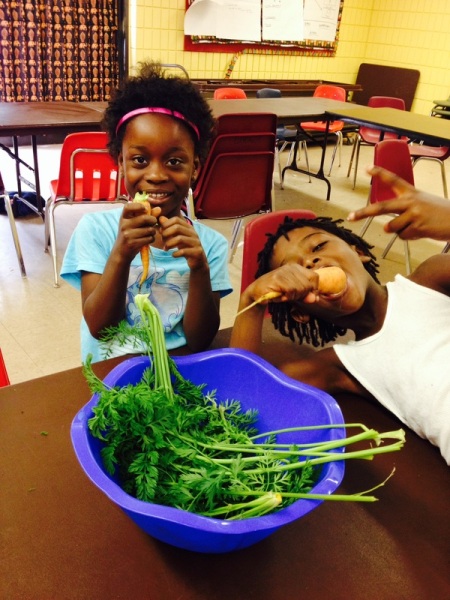 “The United States Department of Agriculture reports that about 23.5 million Americans currently live in food deserts, including 6.5 million children. Typically, food deserts are defined by: 1) the lack or absence of large grocery stores and supermarkets that sell fresh produce and healthy food options; and 2) low-income populations living on tight budgets. These food deserts are also signified by high levels of obesity, diabetes and cardiovascular diseases in the community, which result from residents buying their food from corner stores that sell processed foods, and plentiful fast food options.” (2)
“The United States Department of Agriculture reports that about 23.5 million Americans currently live in food deserts, including 6.5 million children. Typically, food deserts are defined by: 1) the lack or absence of large grocery stores and supermarkets that sell fresh produce and healthy food options; and 2) low-income populations living on tight budgets. These food deserts are also signified by high levels of obesity, diabetes and cardiovascular diseases in the community, which result from residents buying their food from corner stores that sell processed foods, and plentiful fast food options.” (2)
GGB has taken on this issue by including as part of their business model, the planting and harvesting of fresh fruits and vegetables which are included in all of their products. Few people consider how the geographic location of where you grow up influences the healthful food options available. It is shocking that a country with vast accumulated wealth, would have geographical regions that lack access to healthy food. This condition continues to be a real issue. Most especially in impoverished communities like Heritage Park.
As part of our work for the last 40 years in distressed urban communities, Urban Strategies has focused work around increasing economic mobility and self-sufficiency. It has become increasingly obvious that simply connecting people to work is not the complete answer. We must be intentional in including wealth building opportunities into our community work. These opportunities coupled with increased employment will begin to close the wealth gap that exists in communities of color. “It would take black families 228 years to amass the same amount of wealth white families have today, if average black family wealth continues to grow at the same pace it has over the past three decades.” (3)
It is easy to see how this plays out in Heritage Park where the average annual income is $20,267 and the median income is $16,887. GGB has paved the way for others in their community and communities like their own to see entrepreneurship as a legitimat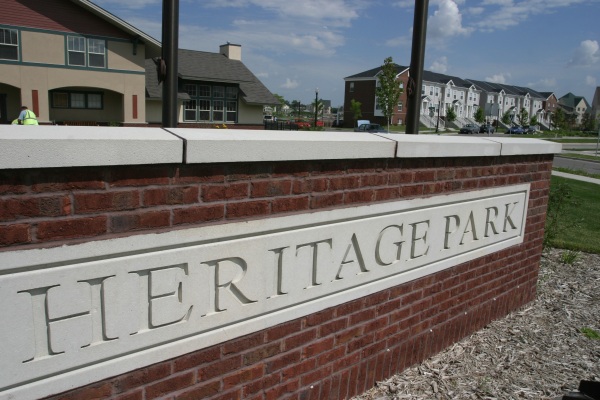 e option to wealth building. Contributing to the wealth gap that exists along racial divides is the lack of minority run businesses. As Dr. Claude Anderson notes, “In 1860, 99% of all Black people worked for Whites. Today, 98% of all Black people work for Whites. You are enjoying a social illusion because you go to someone else’s restaurant, but you don’t own the restaurant yourself.” (4).
e option to wealth building. Contributing to the wealth gap that exists along racial divides is the lack of minority run businesses. As Dr. Claude Anderson notes, “In 1860, 99% of all Black people worked for Whites. Today, 98% of all Black people work for Whites. You are enjoying a social illusion because you go to someone else’s restaurant, but you don’t own the restaurant yourself.” (4).
GGB youth leaders identified opportunity, networking and skill development as a key roles for their success. GGB is doing its fair share to help other youth realize the potential that exists within themselves and their communities. They are operationalizing how entrepreneurship can change the game in wealth attainment and opportunity. Recently, Urban Strategies hosted a youth retreat in Florida. This brought together the youth leadership group from GGB and Miami’s Northpark development. Here GGB leaders shared how they were able to turn their skill set into a thriving business.
Of this experience, Alfonzo said, “It is a way for us to impact other kids by showing them that they can make something happen on their own. A way to show them that their output depends on what they do.”
A store front. A corporate sponsor. A legacy.
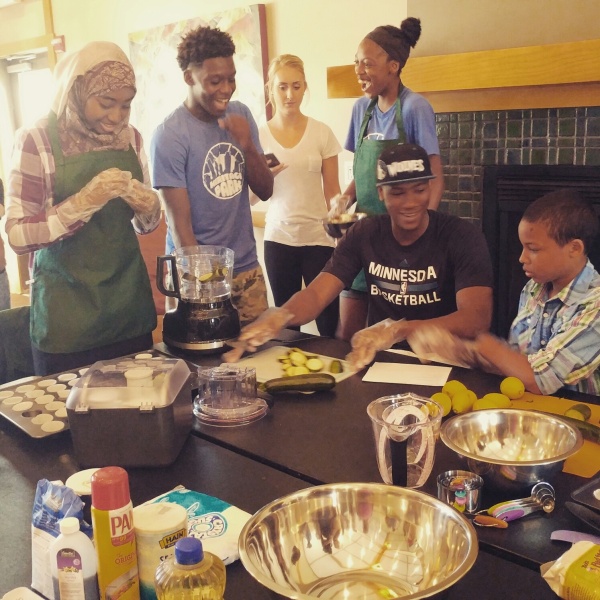
Green Garden Bakery youth show 2016 Minnesota Timberwolves Rookie Kris Dunn their social enterprise.
Not your ordinary responses from teenagers about what they have set as goals that they want to achieve before they graduate from high school. One conversation with Alfonzo, Maya, and Leensa easily showcases that they are extraordinary. Perhaps, the most “extra” part about them is the masterful way in which they work the soil. Not only do they prepare the soil to grow the produce for their products, they also till the soil in other communities to encourage their wealth building opportunities.
The fact that in 2017, we have young people acknowledging and actively confronting the inequities in America brings an incredible source of pride. Conversely, the mere fact America has yet to provide a solution for these same inequities brings an incredible source of shame.
Support Green Garden Bakery here: https://greengardenbakery.weebly.com/
About the Author: Kristie G. Stutler is a Regional Director for Urban Strategies, Inc. She has a Masters of Science in Social Work, 16 years of experience working with system involved youth, and 3 years of experience working in juvenile justice reform. She is a Class 10 Fellow in the Annie E. Casey Children and Families Fellowship, a trainer, a writer, and a lover of all things that rhyme…
References
- http://americannutritionassociation.org/newsletter/usda-defines-food-deserts
- https://newsone.com/1540235/americas-worst-9-urban. -food-deserts/
- https://www.forbes.com/sites/nextavenue/2016/10/05/how-to-close-americas-wealth-gap/#7e8df3f5a873
- https://www.jetmag.com/life/college-advice-business/
